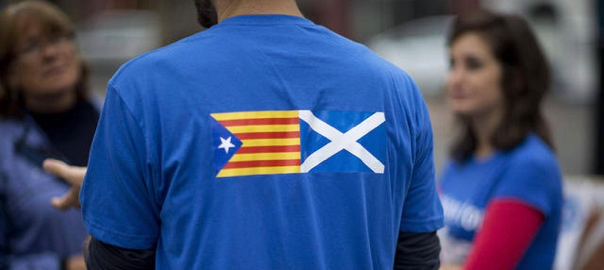22.09.2018 - 08:44
|
Actualització: 22.09.2018 - 10:44
There are many similarities between the independence movements in Scotland and Catalonia – struggles from the 18th century as key moments in their campaign; both have had their language, culture and history suppressed in a bid to mould the countries they are now; both saw a surge in support in the 1960s and 1970s; and both attract widespread support for their cause.
One major difference is that between 1936 and 1939, Spain endured a bloody civil war when the nationalists backed by Germany and Italy fought the Russia-backed republicans, with German and Italian air forces launching bombing raids from Majorca on the civilian population.
When the civil war ended, the 35-year dictatorship of General Franco started. But the desire for a republic of Catalonia never died and still burns deep in the souls of many of its people.
Following the referendum last October 1, the Parliament of Catalonia declared independence from Spain. In response the then Spanish prime minister, Mariano Rajoy, dissolved the parliament and called a general election, which backfired when a pro-independence majority was returned.
Under threat of arrest, many members of the previous executive are living in exile, others have been arrested, as have civic and cultural leaders. Nobody has yet been put on trial, which has created a tense stand-off between Catalonia and Madrid.
Raül Romeva, former Catalan foreign affairs minister, told me dialogue was not possible on an even footing when he has to conduct his half of the conversation from jail. He believes dialogue and negotiations are the path to the successful establishment of an independent Catalonia – difficult when hundreds of politicians, civic and cultural leaders have the threat of imprisonment hanging over their heads.
An interesting development is that Rajoy’s replacement – prime minister Pedro Sànchez – has said he wants to improve the region’s existing self-government and his deputy has suggested the legalistic approach to the Catalan issue would now make way for political engagement.
Which brings us back to the political prisoners.
Jordi Sànchez, former president of the Catalan National Assembly, told me from his prison cell that the Supreme Court was contaminated and most of its judges were using political prisoners as hostages. If this is true, then it is hard to see how anyone can enter into negotiations where the agreed outcomes can be trusted.
Ronnie Cowan is an SNP MP at the UK Parliament
[This article was originally published in Scotland’s The National]


